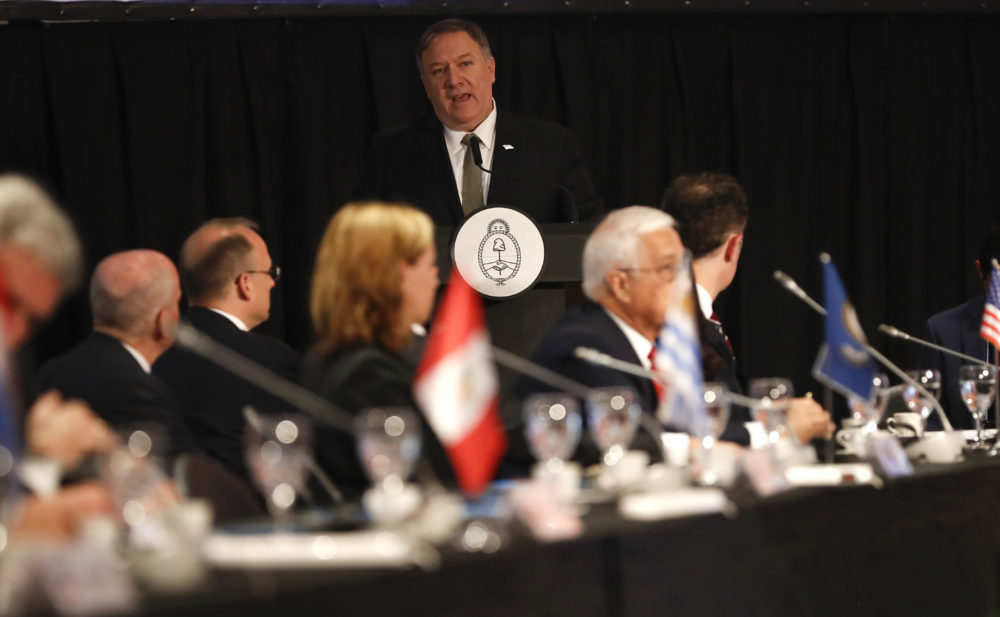Advertisement
Commentary
Gender Equality As A National Security Policy

There are few American workforces today bereft of women: an NFL locker room. The Catholic priesthood. The upper reaches of national security. That last one would seem odd, as more than half of international studies graduate students are women. But consider Mia Bloom’s experience.
Bloom is a terrorism expert today, but as a PhD student at Columbia, “I overheard an assistant professor tell a senior colleague that ‘Mia has a better future on her back than in academia,’” she told The Washington Post. Later, working at a think tank, she disclosed to a male colleague that she’d just learned her dad had brain cancer. He replied, “I would really like to make love to you in this office.” She left.
These macro-aggressions against a woman who speaks eight languages and has worked at prestigious universities and international organizations were not outliers, as the Post article documented widespread sexual harassment and putdowns in the national security field.
Is it any wonder our national security leadership suites are male-dominated?
The move of women into the business world reached orbit as a moral imperative, but it hit escape velocity once corporate America grasped the bottom-line benefits, from higher productivity to lower turnover. A recent Lawfare article suggests practical gains from draining our national security apparatus of a little testosterone, and a lot of sexism, to recruit what one analyst has dubbed “security moms.”
Heather Hurlburt, co-author of the Lawfare piece, knows whereof she writes. The former security and foreign policy staffer for Congress, the White House and State Department told the Post, “I count myself as very fortunate to have only experienced anything like actual assault once.”
Once is the new lucky for assault?
Hurlburt, co-author Tamara Wittes, and other experts are seeking pledges from the presidential candidates “to strive for gender parity in senior national security and foreign policy appointments,” should they be elected commander-in-chief. Fourteen candidates have agreed so far. “Strive for” means it wouldn’t be a rigid quota, but rather a good-faith, overdue effort to diversify the executive offices of the nation’s security establishment.
14 potential commanders-in-chief have vowed their best effort to make national security’s glass ceiling less bulletproof against women.
Security is a two-pronged affair, requiring both nimble diplomacy to keep or restore peace and military prowess when self-defense is required. Lawfare cites one study finding that the few peace agreements with women signatories held up better than the many without them, because female delegates to peace talks collaborate with women’s groups in society to ensure women’s rights in agreements, and thereby women’s buy-in to supporting peace deals.
As for the military side, history abounds with examples of female leaders willing (and sometimes too eager) to pull the trigger: Golda Meir, who led Israel in war and peace; Margaret Thatcher, the “Iron Lady” to the not-easily-impressed Soviet media; ex-secretary of state Madeleine Albright (“What’s the point of having this superb military you’re always talking about if we can’t use it?”); and Hillary Clinton, whose enthusiasm for humanitarian intervention abroad suggested before she lost in 2016 that “she’s looking forward to being a war president on day one.”
Advertisement
The gaggle of presidential candidates includes two women who have laid out foreign and security policy agendas: Elizabeth Warren, whose brothers served in the military, and Tulsi Gabbard, an Iraq war vet, who premises her campaign on ending what she calls “wasteful” U.S. intervention abroad. (Warren signed the candidates’ gender-parity pledge; Gabbard has yet to.)
Despite this leadership history, and “though the U.S. leads the world in national security in many respects,” the Lawfare article says, “the gender diversity of the field has changed little from the mid-20th century.” That sexual harassment mentioned above takes big blame, of course. Other causes range from hiring preferences for the overwhelmingly male corps of military veterans to a lack of work-life balance, including parenthood time, in national security work. The business sector also competes with the security sector for top-flight female talent.
Researchers suggest several fixes. Security agencies could adopt private-sector tactics like flexible job schedules to attract and retain women, mothers in particular. They could collect data to measure how mixed-gender work teams perform vis-a-vis all-male ones.
Meanwhile, 14 potential commanders-in-chief have vowed their best effort to make national security’s glass ceiling less bulletproof against women.
